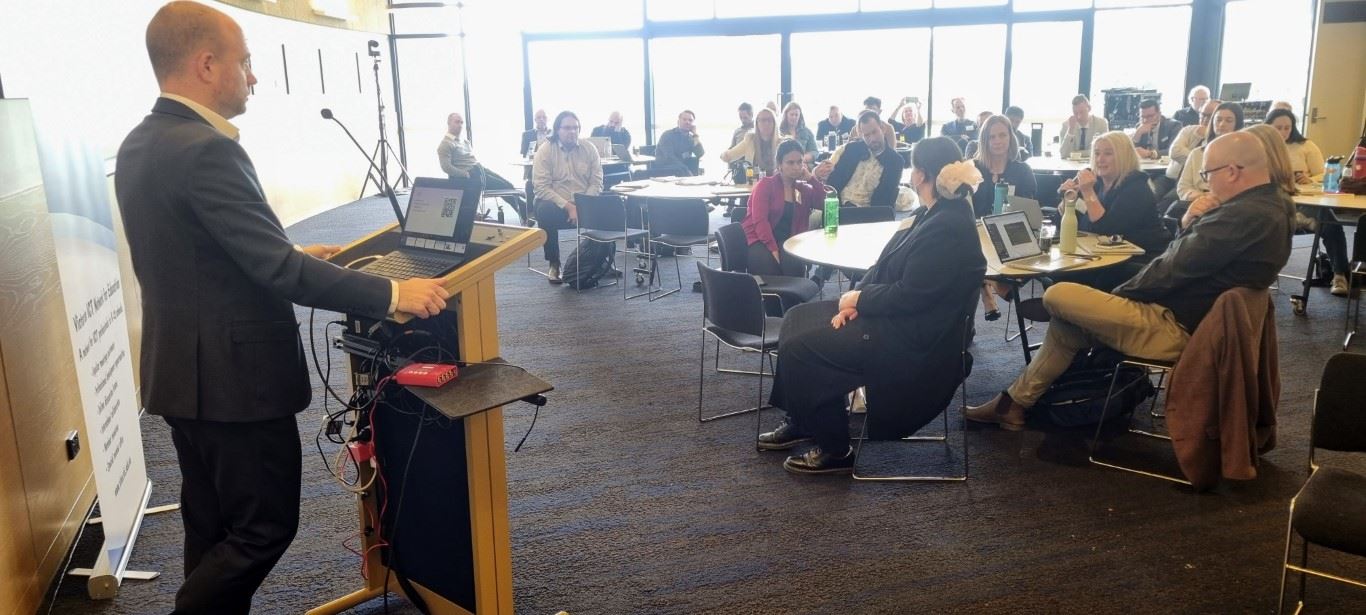At the VINE Teaching with Technology day, hosted at Camberwell Grammar School, we had the pleasure of launching the VINE Generative AI Guidelines to member schools. The guidelines have been distributed as an open access document to VINE members and non-members, and are available on the VINE website here. During the session, we held an “AI round table” with some very rich discussions about what these technologies mean for the future of education.

The Guidelines were developed over a period of two terms in consultation with VINE member schools, reflecting on the draft National Framework and the UNESCO Guidelines for Generative AI in Education and Research, as well as my own PhD studies and work with other schools and universities. Further consultation with a number of VINE member schools during the process helped fine tune drafts and make sure that the Guidelines were as practical as possible.
The Guidelines are broken into three core areas: Teaching and Learning; Privacy, Security and Safety; and Fairness, Accessibility and Equity.
Teaching and Learning
In discussions with VINE, we decided that these guidelines should focus first on Teaching and Learning. Although many schools have leaned on ICT and Digital Technologies staff for support with Generative AI, it’s clear that the technology will impact all levels of teaching and learning, and all disciplines. The guidelines begin with a discussion of academic integrity and assessment. Most schools’ academic integrity policies will not need to be significantly updated to account for AI: at the end of the day, honesty is still honesty. What will need to change, however, are some of our approaches to assessment. We know that students can access generative AI technologies through a range of platforms, and we cannot detect or otherwise identify generated content. Schools need to commit to professional learning to support their staff in navigating these changes.

Privacy, Security, and Safety
One of the key areas of the Guidelines identifies the need to be aware of, and deal with, the potential security issues with generative AI. Your school will already have data breach and sensitive information policies, many of which can remain as-is. You will need to be aware of where data goes, how it is stored, and how it is used by different developers. You’ll also need to be aware of the safety issues with generative AI, including the potential for “deepfakes” or other inappropriate uses of the technology. Again, most of these are covered by existing regulations and laws, but your staff and students need to know what to do in case of abuse. The Guidelines include advice on how to act in these situations, such as reporting to the eSafety Commissioner.

Fairness, Accessibility and Equity
All Artificial Intelligence, including Generative AI, is prone to bias. This is due to how datasets are collected, the communities those datasets do and don’t represent, and the representations of individuals and groups. Understanding bias and marginalisation in AI should form a core part of your staff and student education. Similarly, transparent, and fair use of these technologies should be a high priority. This means that staff and students should acknowledge when they have used AI. For example, if a school uses AI in any stages of reporting, assessment, or communications with the community that should be transparent. Finally, the Guidelines offer advice on personalised learning through generative AI, including some areas to be cautious.
Practical Strategies
Each area of the Guidelines is accompanied by practical strategies which are intended to help school leadership teams implement the advice. These include academic integrity modules for students, registers of secure apps and services, and professional learning calendars. In the appendices for the Guidelines we have also included a fully articulated academic integrity policy, an example of the apps register, a list of current (as of November 2023) recommended apps for teachers, and a version of the Guidelines which can be adapted to your school context.
The intention for these Guidelines is to provide a starting point for school leadership teams and staff to discuss generative AI, including the potential benefits and challenges. They highlight areas where you may need to make minor adjustments to existing policies, and also help to guide the creation of new policies for these new technologies.
If you have any questions about the Guidelines or how to use them in your school, please reach out directly or through VINE.
The VINE Guidelines for Generative Artificial Intelligence can be accessed on the VINE website here.
Leon Furze
https://leonfurze.com